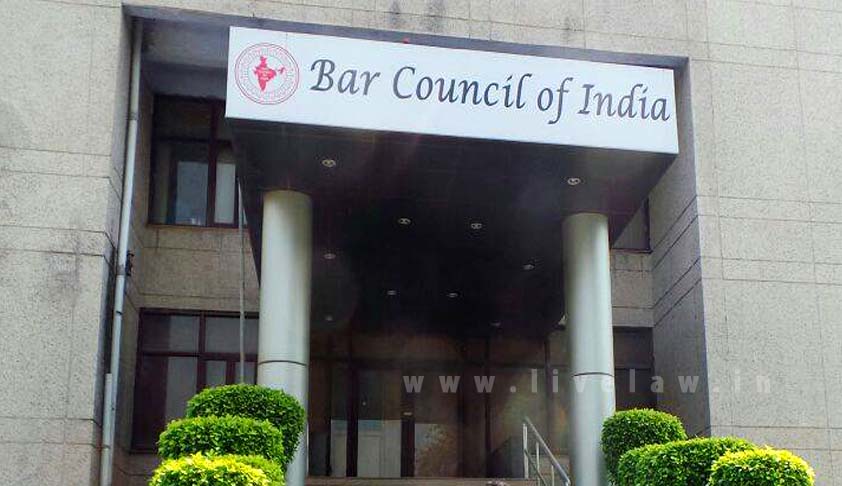- Home
- /
- News Updates
- /
- Ban On Legislators Practising As...
Ban On Legislators Practising As Advocates: BCI Calls General Council Meet On Sunday To Consider Sub-Committee Report
akanksha jain
2 Feb 2018 6:39 PM IST
The Bar Council of India has called its General Council Meet on Sunday to decide the issue of ban on Members of Parliament and the Members of Legislative Assemblies from practicing as advocates.BCI chairman Manan Kumar Mishra told LiveLaw that a meeting of General Council Meet has been called on Sunday.It is to be noted that the three-member committee of RG Shah, BC Thakur and DP...
The Bar Council of India has called its General Council Meet on Sunday to decide the issue of ban on Members of Parliament and the Members of Legislative Assemblies from practicing as advocates.
BCI chairman Manan Kumar Mishra told LiveLaw that a meeting of General Council Meet has been called on Sunday.
It is to be noted that the three-member committee of RG Shah, BC Thakur and DP Dhal constituted to look into the representation of advocate-activist and BJP leader Ashwini Upadhyay calling for ban on legislators from practising as advocates had submitted its report to BCI chairman last week.
One of the members on the sub-committee confirmed that the Committe submitted the report but refuses to divulge its content saying the same was "confidential".
"We called a general council meeting on Sunday to deliberate on the findings of the committee," said Mishra.
It is to be noted that the BCI had late last year constituted the committee to look into the representation of Upadhyay wherein he had made written submissions before the BCI giving reasons why the ban was a much-awaited check.
The 13 reasons Upadhyay gives on why legislators should be so barred are:
- MLAs and MPs get salary from the Consolidated Fund of India, hence, they are employee of the State and the BCI Rule 49 restricts a salaried employee from practicing as advocate.
- Under Section 21 of the Indian Penal Code and Section 2(c) of the Prevention of Corruption Act, MLAs and MPs are public servants. Hence, allowing them to practice, as an advocate and restricting other public servants is arbitrary, irrational and violation of Articles 14-15 of the Constitution.
- MLAs and MPs get salary and other benefits from public fund. Therefore, appearing against the Central and State Governments itself is not only unethical and immoral but also a professional misconduct.
- Many MLAs and MPs hold corporate retainership and appear against the State to defend their lawbreaker clients in the court of law, which is the matter of conflict of interest.
- It is an honorable profession but does not remain noble merely by calling it as such, unless an advocate is fully dedicated for this profession. Similarly, legislators are also expected to dedicate their fulltime to public and their constituents ahead of their personal and financial interests.
- Nobility of the profession of Law has to be preserved and protected. Therefore, provisions of the Advocates Act and the BCI Rules must be given effect in the letter and spirit to maintain clean and efficient Bar to serve the cause of justice.
- The Supreme Court, in its judgment dated 8.4.1996 [ Haniraj L Chulani versus Bar Council of India], has held that a doctor cannot practice as an advocate before the court of law until he leaves his medical practice.
- The Supreme Court, in its judgment dated 17.04.1998 [PV Narasimha Rao vs State (CBI/SPE)], has held that MLAs and MPs are public servant. It is not out of context to state that MLAs and MPs get salary every month.
- The Supreme Court, in its judgment dated 03.01.2001 [Satish Kumar Sharma versus Bar Council of Himachal Pradesh], has held that a salaried employee cannot practice as an advocate before the court of law.
- The Supreme Court, in its judgment dated 11.3.2004 [Madhav M Bhokarikar vs Ganesh M Bhokarikar], has held that an active director of a business cannot practice as an advocate before the court of law.
- The Gujarat High Court, in its judgment dated 16.06.2017 [Jalpa Pradeep Bhai Desai versus Bar Council of India & Others], has held that a salaried legal consultant cannot practice as an advocate before the court of law.
- Legal profession requires fulltime attention and would not countenance an advocate riding two horses at a time.
- It is impossible for a person to perform two fulltime duties at a time. Therefore, MLAs and MPs must be barred from practicing as an advocate.


